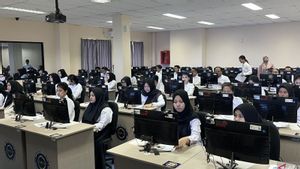JAKARTA - President Joko Widodo (Jokowi) gave good news. The prevalence of stunting due to chronic malnutrition in Indonesia in 2022 fell to 21.6 percent thanks to the hard work of all parties.
"It has been conveyed by the Minister of Health, in 2022 the figure has dropped to 21.6 percent. This is the hard work of all of us," said Jokowi at the National Working Meeting on Family Development, Population and Family Planning and the Acceleration Program for Stunting Reduction in Jakarta, Wednesday, January 25, as reported by Antara.
Jokowi said that the reduction in stunting rates in 2022 was quite drastic compared to when he first led the government in 2014, which was 37 percent.
"Stunting in our country is a very big homework that must be completed immediately. I entered 2014 with 37 percent. I was shocked," said Jokowi.
Jokowi believes that the government's target to reduce the stunting rate to 14 percent by 2024 can be achieved with synergies and improvements to central and local government programs.
"We are all moving together, that number is not a difficult number to achieve as long as everyone works together," said Jokowi.
The President explained that the problem of stunting in Indonesia must be resolved immediately, because it is one of the keys to improving the quality of human resources (HR).
Improved the quality of human resources, said Jokowi, is very important so that Indonesia is able to compete in regional and global areas. Increasing Indonesia's competitiveness will grow the economy and people's welfare.
"The current position of all countries is competition. Competing with each other. It looks like yes, for example there is a G20 meeting, it looks like a good shake-off, but everyone competes with each other. In ASEAN we meet each other shaking hands, embracing, but competing. Mutual investment, technology, all countries and the key are quality human resources," said President Jokowi.
In 2021, the prevalence of stunting nationally is 24.4 percent. The World Health Organization (WHO) recommends stunting prevalence below 20 percent.
The English, Chinese, Japanese, Arabic, and French versions are automatically generated by the AI. So there may still be inaccuracies in translating, please always see Indonesian as our main language. (system supported by DigitalSiber.id)













